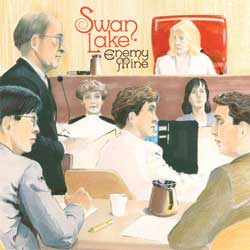|
|
|
|
 |
||
|
|
|
I've always sucked at math‚ and now it's coming back to haunt me. I'm faced with a real-life word problem that I can't figure out:
Q: In order to compete with Arcade Fire‚ all the other indie groups in Canada got together and formed a super-group. After days of tryouts‚ the bands voted and decided that the group would be comprised of one member of Destroyer‚ one member of Wolf Parade‚ two members of Frog Eyes‚ one member of Hello‚ Blue Roses‚ one member of New Pornographers and one member of Sunset Rubdown. How many Canadian hipster Gods made it in the band?A: Three. Cary Mercer‚ Spencer Krug and Dan Bejar are beyond prolific to the point where they have more bands than most groups have albums. After their debut‚ the group was assumed to be another side project‚ but Enemy Mine suggests a long-term partnership. The album is divided into nine songs‚ with each songwriter showcased in three apiece. On "Spanish Gold‚ 2044‚" Mercer frantically rambles in defiance of the backing instrumentation‚ while Krug and Bejar chime in with calming "whoa-oh-oh's." "Gold" commences the strong introductory third of the album‚ which is successfully closed out by "Heartswarm‚" a bizarre Bejar ballad.
Enemy's middle portion drags‚ lacking collaboration between the artists and thus feeling like b-sides from their respective solo projects. Fortunately‚ quality spikes at the end‚ with a sincere and pensive Krug at the piano singing about the woes of growing old on "A Hand At Dusk." Mercer then thrives as conductor on Enemy's final track‚ leading that gang through six minutes of memorable chaos on "Warlock Psychologist." As "Psychologists" proves‚ the strongest moments of the album are when every member is significantly involved. Many tracks feel distinctly driven by one writer‚ which leads to the under-utilization of Swan Lake's collective wealth of talent. Enemy isn't the career album for any of these writers‚ but it's still an impressive indication of how all three can create quality music consistently.
suggestions
Shows: Grand Point North Festival 2012
Blog: Best Songs of 2012: The Walkmen - "Heaven"
Shows: NOLA Jazz & Heritage Festival (Part II)
Shows: Mile High Festival
Shows: Bonnaroo 2009
More on: Swan Lake
Shows: Grand Point North Festival 2012
Blog: Best Songs of 2012: The Walkmen - "Heaven"
Shows: NOLA Jazz & Heritage Festival (Part II)
Shows: Mile High Festival
Shows: Bonnaroo 2009
More on: Swan Lake
new to state of mind
Shows: moe.
Shows: Yonder Mountain String Band
Shows: Grand Point North 2014
Shows: Catskill Chill 2014
Shows: moe.down 15
Shows: Gov't Mule
Shows: Umphrey's McGee
Shows: Newport Folk Festival 2014
Shows: Widespread Panic
Albums: Phish - Fuego
Shows: moe.
Shows: Yonder Mountain String Band
Shows: Grand Point North 2014
Shows: Catskill Chill 2014
Shows: moe.down 15
Shows: Gov't Mule
Shows: Umphrey's McGee
Shows: Newport Folk Festival 2014
Shows: Widespread Panic
Albums: Phish - Fuego
most popular
Blog: New Video/Song From Dr. Dog - "Broken Heart"
Blog: Radiohead: Adam King tries to convince me they are aliens…
Blog: Mountain Oasis welcomes NIN‚ Bassnectar and Pretty Lights
Blog: Mehliana Tour (Brad Mehldau + Mark Guiliana)
Blog: Video: Club d'Elf with Marco Benevento - "Bass Beatbox"
Blog: Reed Mathis and Victor Wooten Talk Bass
Features: Conversation with Kurt Rosenwinkel
Features: Conversation with Tommy Benedetti of John Brown's Body
Features: Conversation with Bill Kreutzmann
Shows: Rothbury 2009
Blog: New Video/Song From Dr. Dog - "Broken Heart"
Blog: Radiohead: Adam King tries to convince me they are aliens…
Blog: Mountain Oasis welcomes NIN‚ Bassnectar and Pretty Lights
Blog: Mehliana Tour (Brad Mehldau + Mark Guiliana)
Blog: Video: Club d'Elf with Marco Benevento - "Bass Beatbox"
Blog: Reed Mathis and Victor Wooten Talk Bass
Features: Conversation with Kurt Rosenwinkel
Features: Conversation with Tommy Benedetti of John Brown's Body
Features: Conversation with Bill Kreutzmann
Shows: Rothbury 2009
